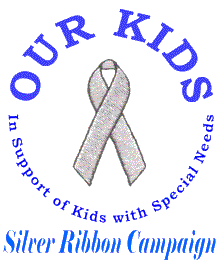

| On Chronic Sorrow
From the Hydrocephalus Association Newsletter, Spring 1998 Chronic Sorrow is a term coined by sociologist Simon Olshanshy to describe the long-term reaction of parents who have a child with a disability. This pervasive reaction is often not recognized or understood by those around the parents--professionals, family and friends. These feelings of chronic sorrow are normal and to be expected and accepted, given the life-long implications for the family and child. Many factors can affect the intensity and exhibition of chronic sorrow: the parent's personalities, the severity of the disability, the nature of the disability and the adequacy of support and services provided. Chronic sorrow does not mean that the parents don't love or feel pride in their child. These feelings, and many other feelings, exist alongside the sadness. It is as if many threads are woven side by side, bright and dark, in the fabric of the parent's lives. They co-exist; they do not blend into one color, or feeling. Because ours is such a "can do"
society, there is pressure on parents to quickly put their feelings of
sadness away or deny them. Parents are told to "think positively" and "to
get on with your lives." They are told that God has "selected" them to
receive this special child because they are such strong people.
Grieving, however, is a process that takes time, often years. It's a prickly bush that one must go through, not jump over. However, there are ways to support the process of grieving. Most parents frond support in a community of people who understand because they, too have lived the experience. It is lonely to be the only family on the block with a child with a disability. Being part of a support group or organization helps to combat feelings of isolation. Engaging in personal activities that do not center on the family member with a disability can help increase feelings of competency and self-worth. Counseling, especially at times of significant stressful milestones, can be useful. Chronic sorrow becomes a permanent part of the personality structure of most parents who have a child with a disability. It's a normal response. Its thread narrows and widens depending on life situations; most often it is accepted with courage. And, although permanent, if is not the dominant force in interactions with our children. The dominant forces are love
and feelings of connectedness to them.
----------
The article comes from the Hydrocephalus Association Newsletter, Spring 1998, page 9, and was originally adapted from Meeting Ground, a publication of the Courage Center and is used with the stipulation that the original source be credited. For more information on the Hydrocephalus Association: 870 Market Street # 955 San Francisco,
California 94102
|
Silver
Ribbon Campaign

Silver Ribbon Campaign is a grass roots effort started by members of the Our-Kids Mailing List, as a way to identify individuals who are interested in promoting awareness and support of children with disABILITIES. http://www.iso.net/~chigger/src/ Our-Kids is a mailing list for
professionals, friends, and family members of children with disABILITIES
of all sorts. Our-Kids kids have needs that are different than adults,
and that's what we're trying to promote.
|